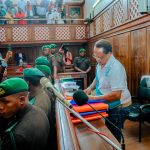
Like thousands of Liberians, 50-year-old Wolo spent decades establishing a new life in a Ghanaian refugee camp, but has now returned to her homeland in a wave of repatriations by the Liberian government.
Like many other returnees, Wolo has since lost all trace of her family in the country.
With little connection to the land she once called home, Wolo must once again start her life from scratch.
“We were out of the country for a very long time so to just come back and rush into the society it’s not easy,” she told AFP, adding that her only remaining relative was a brother in Ivory Coast.
Wolo and three of her Ghanaian-born children have been stuck for three months in a transit centre just outside the capital Monrovia, with little prospect of permanent accommodation or employment on the horizon.
“I feel downhearted being here because the life I have met here is quite different and difficult,” Wolo said, adding she was concerned that her children were missing school.
An estimated 250,000 people died during Liberia’s two civil wars between 1989 and 2003, which were notorious for their brutality and use of child soldiers.
Around 750,000 out of a population of around 2.5 million were internally displaced or became refugees, according to the UN’s refugee agency UNHCR.
Many scattered to nearby west African states, including Ivory Coast, Guinea, Sierra Leone and Ghana.
Ghana’s Buduburam camp housed around 38,000 Liberian refugees at the height of the conflict, with many later repatriated in programmes facilitated by international agencies.
The UNHCR ended the refugee status of Liberians in 2012 on the basis that peace and stability had been restored to their country.
Ghanaian traditional authorities demolished Buduburam camp in February 2024, driving the remaining thousands from their homes.
– ‘It hurts me’ –
The Liberia Refugee Repatriation and Resettlement Commission (LRRRC) in May began a wave of voluntary repatriations with funding from the Liberian government.
More than 1,500 have so far travelled back to Liberia, with the LRRRC saying it plans to repatriate a further 2,761 by the end of the year.
After fleeing the conflict at the age of nine and spending his entire adult life in Ghana, 43-year-old Timothy Jackson had no notion of what life would be like in the country he had grown up in.
“I can remember how people were rushing and fighting to climb on the ship. People were pushing each other while some people were falling in the water,” he recalled, describing his last memories of war-torn Liberia.
Jackson built a life as a driver, mechanic and excavator operator in Buduburam camp, but when authorities demolished his two-bedroom house last year, he decided he had no choice but to return.
Jackson left his wife and three children in Ghana due to uncertainty about what life would be like in Liberia, but said he hoped his family would join him once he was back on his feet.
For now, he and his 25-year-old son sleep in a kitchen of the transit centre, where he said food was sometimes scarce.
“It hurts me a lot every time I have to talk about this,” he said, lamenting that he no longer had a job to support his family.
– ‘No identity’ –
Rachel Barwon, 29, is one of many Ghanaian-born Liberians who had never stepped foot in the country before her repatriation.
“We don’t have any identity here now, except for being born to Liberian parents, so life here is somewhat challenging and different”, she explained.
Barwon said conditions in the transit centre were tough, and that she hoped to be reintegrated so that she could become a social worker and give back to society.
The LRRRC has given each head of a family $300 and each dependent $225 with the aim of starting their new life.
But both Wolo and Jackson said the amount wasn’t enough to pay for rent and other expenses.
The LRRRC’s deputy executive director, A. J. Armah Karneh, told AFP the government had provided at least $1.3 million for the repatriation of refugees.
He said steps were being taken to place school-age children into education, but could not commit to a timeframe for the reintegration of returnees who had lost all family contact.
eks/acc/giv
© Agence France-Presse






